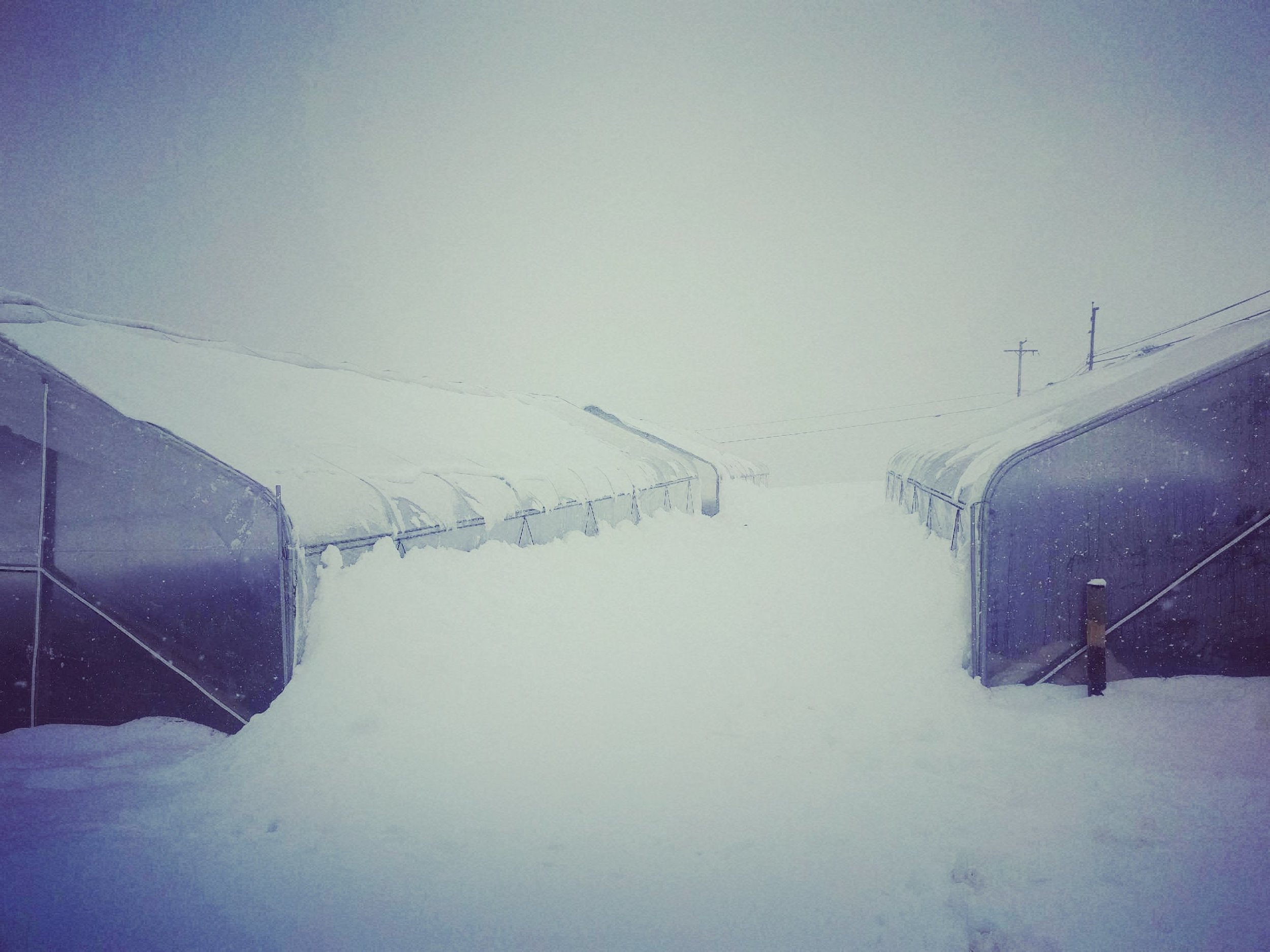Wasn't that something?
When the dust (snow?) settled, we ended up with somewhere around 12-16 inches of snow up here last week. And it's actually blowing another dusting sideways now as I type. I was in the city on Wednesday and there was a pretty well-defined line around Belfast road, where the total accumulation jumped from 5-ish to over a foot. It's a pretty vivid reminder what a difference a random degree or two can make. In this case for us, putting us into an early week delay into getting out into the fields with spring crops, with more rain on the schedule before we've even had a full melt yet.
I'm sure we'll be fine, but this is an excellent reminder of the types of challenges farmers are facing due to climate change, even in a region such as ours that is seeing our total rainfall stay relatively steady and for which extreme weather events are still fairly rare. It's largely about predictability. As farmers, we thrive on it. I need to know that if I plant one crop today--say carrots--because it worked well last year, that the same crop will face similar circumstances the following year--that it won't suddenly drop below 25F and stunt the seedlings. Of course, change is inevitable, but we still rely on the collective wisdom from centuries of growing in the mid-Atlantic to determine each of our actions today. As those averages and trends change in unpredictable ways, it means that we get caught by unfavorable growing conditions when we least expect it, and are unable to take advantage of favorable conditions because we don't know when they're coming.
In the case of this storm, it's an example of an alarming trend observed over the last couple decades on the East Coast by organizations like Penn State, UMD, and Johns Hopkins' Center for a Livable Future. While annual rainfall has stayed steady, precipitation has begun to concentrate in larger individual events, concentrated in Spring and Fall, while we have begun to see a tendency toward drought and heatwaves in the summers. For us in this storm and any ensuing rain, it means we're locked out of our fields for an unfortunate week or two and will therefore have later carrots, etc. But this can also mean that in future years, we and other farmers might be more hesitant about how early to plant many of our spring crops, and will push our break-ground dates back further into April. Ironically, warming average temperatures might actually be shortening our growing season.
This sort of calculation is fundamentally changing what farmland can be used for what products and ultimately altering whole business models. Hay farmers in Maryland have had such a tough decade with wet spring lockouts followed by oppressive, dry summers, that many are changing crops or retiring entirely. Even weirder, corn farmers have seen such yield increases due to climate and technology that their prices are in a many-year free fall. So it goes beyond a few late carrots.
But the important thing to remember is that farmers have the power to reverse many of these trends. Sustainable, soil-building practices can mitigate or even reverse carbon pollution. And expanding markets for locally sourced and direct-to-consumer farm products is increasing the dollar share that farmers see for their product, allowing them to experiment and adapt new technologies to overcome a less predictable, more hostile climate.
Bryan and Ellie, Joanna's mom, picking salad this morning
RESERVE YOUR SUMMER CSA BY MARCH 31ST!
There's only 6 days left to reserve your share! We hope you'll put down your $50 deposit to reserve your main season CSA share today! We've also added two new pick up locations that you're welcome to switch to once the main season starts in May: Charles Village and Ednor Gardens! We're also working to secure a pick up site in or near Federal Hill. Of course you are still welcome to sign up for a summer share after the March 31st deadline, you just won't get first pick in share size and pick up location any longer.
To complete your summer sign up on Small Farm Central, click here. In the green box at the top of the page, select 2018 season. Select "2018" on the next page. Next, under "Main Season CSA," select "Re-enroll" (it's the last option listed.) Let us know if you have any questions or issues.
What We're Eating
Joanna's Deviled Eggs
Image via marthastewart.com
Deviled eggs are one of my favorite foods. They're rich and fancy feeling, and so satisfying to make. Here's my go-to recipe. Add-ins are great and can range from hot sauce to Old Bay to tarragon to anything else that your heart desires!
6 eggs
2-3 T mayonaise
2-3 T sour cream
2t mustard
salt
pepper
smoked paprika
Hard boil the eggs using whatever method you like (I'm partial to the New York Times method.) Once eggs are cool, peel them and slice them in half. Pop or scoop out the yolks into a small bowl. Combine with all other ingredients and mash together with a fork. I like my filling to have diversity in texture, but if you like a smoother filling, you could probably use an immersion blender in addition. Fill each egg white back up with about 1T of filling. Top with crunchy salt, black pepper, and smoked paprika. Enjoy!
Have a great week!
- Joanna and Bryan


